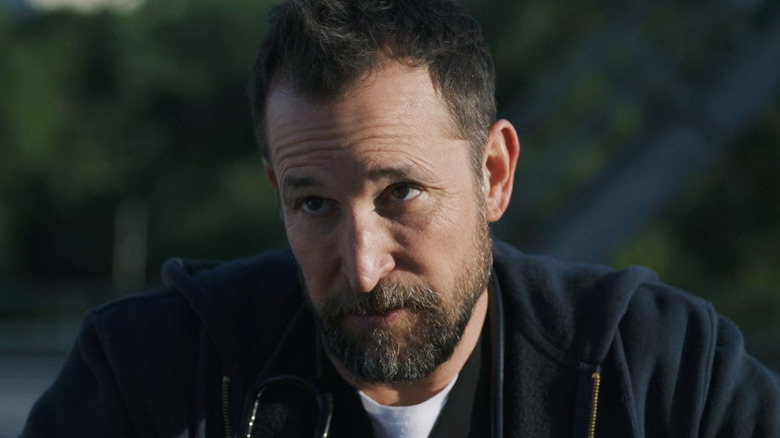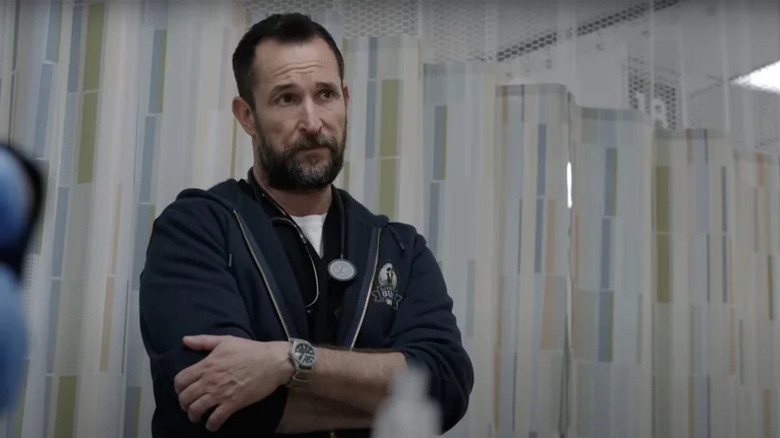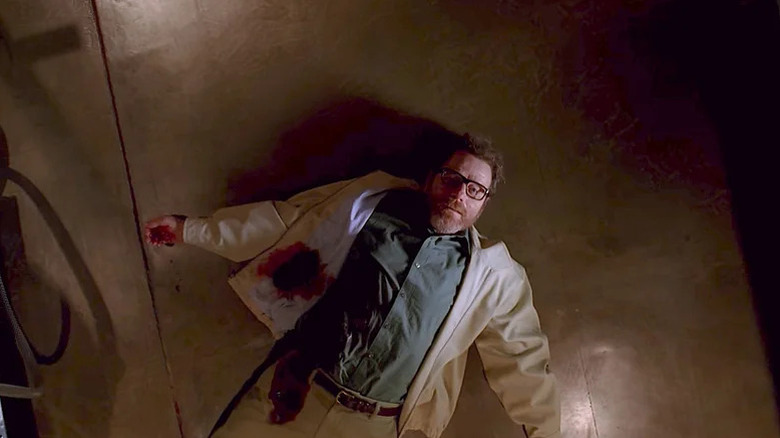Noah Wyle Says The Pitt Is TV's Antidote To Two Beloved TV Shows
Anyone who made it to the end of "The Pitt" surely felt a slight sense of loss when the show was over. Created by former "ER" writer/producer R. Scott Gemmill, the show also brought "ER" star Noah Wyle on to star and executive produce alongside fellow former "ER" producer John Wells (don't call "The Pitt" an "ER" spin-off, though). Together, the trio created a show that feels so real and immersive that once it's over, you sort of feel like you've had to say goodbye to your friends in the emergency room.
Ostensibly a medical drama with a "24"-like hook (the series plays out in real-time across 15 hour-long episodes) "The Pitt" was really so much more than that. For one thing, its real hook was that it simply demonstrated what it's really like to be an emergency room doctor. Rather than ratcheting up the drama with soapy storylines or trying to include the most bizarre and unlikely medical cases possible, "The Pitt" hews as closely to real-life emergency room experiences as possible, earning plaudits for its medical accuracy in the process. But it also had an immense heart that was projected through characters that felt very much like real people, to the extent that the show at times felt more like a documentary than a drama.
Then there was Wyle himself, who earned an Emmy nomination for Best Actor in a Drama Series for his portrayal of Dr. Michael Robinavitch. The senior attending physician at the fictional Pittsburgh Trauma Medical Center had a day from hell in season 1. Not only was he faced with multiple tragedies, but all of them happened to occur on the anniversary of his mentor, Dr. Montgomery Adamson, passing away during the pandemic. Wyle depicted Dr. Robby's gradual mental breakdown so convincingly it was genuinely hard to watch when the man finally lost his grip in episode 13 of season 1. Prior to this, Dr. Robby seemed to handle the pressures of the job with a practiced professionalism, making his vulnerability in this moment all the more affecting. For Wyle, it seems this was part of what made the character so interesting and, more importantly, so necessary for our modern era.
Noah Wyle thinks Dr. Robby is the anti-Walter White
Though his methods are sometimes called into question throughout season 1 of "The Pitt," the overwhelming sense you get is that Dr. Robby is a truly good guy trying his best. In that way, he was representative of the creators' underlying motives for making the show in the first place. As Noah Wyle himself explained on numerous occasions during the press tour for season 1, his real reason for making "The Pitt" was that he was hearing from beleaguered medical professionals during the pandemic who had been put through the wringer. As such, he and his collaborators wanted to shine a light on the medical community who had weathered such a bitter storm. This is the genesis of the Dr. Montgomery Adamson storyline, which involved Dr. Robby having to pull the plug on his mentor during the height of the pandemic. The show started off with the best intentions, and Dr. Robby's essential goodness is merely an extension of that.
For Wyle, there's another reason why playing a truly good guy is so important, but it has less to do with medical professionals and more to do with wider culture. Speaking to The Wrap, Wyle was asked about how the show explores ideas such as "toxic masculinity," and how Dr. Robby represents a different kind of male role model. In response, he recalled hearing about a speech delivered to the Writers Guild by "Breaking Bad" creator Vince Gilligan. "He basically laid a lot of society's ills at the feet of television writers," explained Wyle. "He said that for the last 20 years, they've written bad guys too well. The Tony Sopranos and the Walter Whites that have populated our televisions went from being cautionary tales or morality tales to aspirational tales. And that skewed our balance and values a little bit."
Wyle went on to say that he views Dr. Robby as "a little bit antidotal to that trend," and as someone who's "just trying to do the best he can and not let his demons get in the way." He continued, "I think there are a lot more guys like Robby out there than there are Tony Sopranos. So it's not a bad example to put back on TV."
Are TV writers and their villains really the problem?
Noah Wyle's second-hand recollection of Vince Gilligan's speech was pretty much accurate. Gilligan was the 2025 recipient of the Writers Guild of America's Paddy Chayefsky Laurel Award for Television Writing Achievement. The "Breaking Bad" creator used his speech to basically assert that he didn't want to be remembered for writing the character of Walter White, citing the alarming prevalence of real-life villains in 2025. "Walter White is one of the all time great bad guys," he said. "But all things being equal, I think I'd rather be celebrated for creating someone a bit more inspiring. In 2025 it's time to say that out loud, because we are living in an era where bad guys, the real-life kind, are running amok."
Long before Gilligan begrudgingly accepted his award, Walter White actor Bryan Cranston acknowledged the influence of "The Sopranos" and its famous anti-hero protagonist Tony Soprano in a post on X, but these are just two in a long line of anti-heroes who have been celebrated by mass culture in a way that perhaps their creators didn't entirely intend. In the case of Walter White, there is that moment in "Breaking Bad" where he drops the facade and tells his long-suffering wife Skyler (Anna Gunn) that rather than building his meth empire to help his family, "I did it for me. I liked it. I was good at it. And I was really — I was alive." In that moment, Giligan and the writers provided an emphatic refutation of the notion that White was somehow a selfless, virtuous figure. But it seems the show creator is perhaps not as troubled by his own writing as he is by how Walter White has been embraced by popular culture.
I'm not sure writing stories based on how pop culture might misconstrue your creation is the best approach. Thankfully, in the case of Wyle and Dr. Robby, that clearly isn't how the character or the show came together, and the actor is just pleased that this particular story involved a positive role model. Still, I'm not convinced the problem lies with TV writers creating compelling anti-heroes or villains as much as it does with the audience's proclivity for turning these figures into icons, which in and of itself is a complex issue. It would take a much longer article to parse that particular conundrum, so let's just rest easy in the knowledge that good guy Dr. Robby will soon return for season 2 of "The Pitt."


